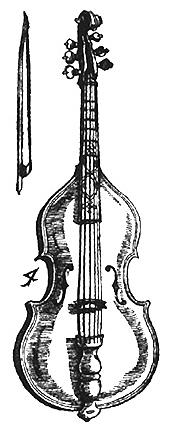* You are viewing Posts Tagged ‘Samuel Hartlib’
 Last Saturday’s edition of The Early Music Show on BBC Radio 3 showcased on a fascinating collection of instrumental music from seventeenth-century Germany (land of Comenius, and a comparative focus our 2011 conference), known as Das Partiturbuch Ludwig. The manuscript was put together by musician Jacob Ludwig as a birthday present in 1662 for his former employer in Wolfenbüttel, Duke August of Gotha. Now in the care of the Herzog August Bibliothek, it provides a rare insight into the musical cultures of the Holy Roman Empire in the middle decades of the seventeenth century. The programme is available for the next few days on the iPlayer.
Last Saturday’s edition of The Early Music Show on BBC Radio 3 showcased on a fascinating collection of instrumental music from seventeenth-century Germany (land of Comenius, and a comparative focus our 2011 conference), known as Das Partiturbuch Ludwig. The manuscript was put together by musician Jacob Ludwig as a birthday present in 1662 for his former employer in Wolfenbüttel, Duke August of Gotha. Now in the care of the Herzog August Bibliothek, it provides a rare insight into the musical cultures of the Holy Roman Empire in the middle decades of the seventeenth century. The programme is available for the next few days on the iPlayer.
James Brown
December 02, 2009
Events, Project Updates
Tags: Samuel Hartlib
![Frontispiece from Andrea Buonaccorsi’s ‘Newes come latle fro[m] Pera’, published London, 1561 (Bodleian Library, Oxford). newes](../../../../wp-content/uploads/2009/12/newes.jpg) Dr Leigh Penman, the Project’s Samuel Hartlib Postdoctoral Fellow, will this week deliver a paper in the Oxford History Faculty’s Early Modern Europe Seminar entitled ‘Prester John’s Legacy: The Hartlib Circle, Andreas Haberweschel, and the Fantasy of a Christian Kingdom in the Orient in Seventeenth-Century Europe’. As Leigh describes it, ‘in 1643, word reached the London-based intelligencer Samuel Hartlib that diplomats from a heretofore unknown Christian kingdom had recently visited an obscure Bohemian physician, Andreas Haberweschel, at The Hague. Anticipating funds and weapons for Protestant Europe, Hartlib and his compatriots greeted the news, despite its dubious provenance, with delight and enthusiasm. Yet, perhaps predictably, not everything was as it seemed. In this paper, which draws extensively on the Hartlib Papers, I shall unpack some of the contemporary codes and contexts that made news of this Christian kingdom of the ‘Indies’ plausible for those that heard it. I want to use the incident as a looking glass in which we might reflect on the activities and expectations of Hartlib and his circle, as well as of European Christians more broadly. For this incident not only tells us much about the nature of contemporary Reformed eschatology, but also sheds light upon the contemporary reception and assimilation of geopolitical news, methods of constructing ideas of the Christian self through the projection of values on to the other, as well as nascent aspects of imperial ideological discourse’. The paper will take place at 2.15pm on Friday 4 December in the Rees Davies Room of the History Faculty.
Dr Leigh Penman, the Project’s Samuel Hartlib Postdoctoral Fellow, will this week deliver a paper in the Oxford History Faculty’s Early Modern Europe Seminar entitled ‘Prester John’s Legacy: The Hartlib Circle, Andreas Haberweschel, and the Fantasy of a Christian Kingdom in the Orient in Seventeenth-Century Europe’. As Leigh describes it, ‘in 1643, word reached the London-based intelligencer Samuel Hartlib that diplomats from a heretofore unknown Christian kingdom had recently visited an obscure Bohemian physician, Andreas Haberweschel, at The Hague. Anticipating funds and weapons for Protestant Europe, Hartlib and his compatriots greeted the news, despite its dubious provenance, with delight and enthusiasm. Yet, perhaps predictably, not everything was as it seemed. In this paper, which draws extensively on the Hartlib Papers, I shall unpack some of the contemporary codes and contexts that made news of this Christian kingdom of the ‘Indies’ plausible for those that heard it. I want to use the incident as a looking glass in which we might reflect on the activities and expectations of Hartlib and his circle, as well as of European Christians more broadly. For this incident not only tells us much about the nature of contemporary Reformed eschatology, but also sheds light upon the contemporary reception and assimilation of geopolitical news, methods of constructing ideas of the Christian self through the projection of values on to the other, as well as nascent aspects of imperial ideological discourse’. The paper will take place at 2.15pm on Friday 4 December in the Rees Davies Room of the History Faculty.
 Last Saturday’s edition of The Early Music Show on BBC Radio 3 showcased on a fascinating collection of instrumental music from seventeenth-century Germany (land of Comenius, and a comparative focus our 2011 conference), known as Das Partiturbuch Ludwig. The manuscript was put together by musician Jacob Ludwig as a birthday present in 1662 for his former employer in Wolfenbüttel, Duke August of Gotha. Now in the care of the Herzog August Bibliothek, it provides a rare insight into the musical cultures of the Holy Roman Empire in the middle decades of the seventeenth century. The programme is available for the next few days on the iPlayer.
Last Saturday’s edition of The Early Music Show on BBC Radio 3 showcased on a fascinating collection of instrumental music from seventeenth-century Germany (land of Comenius, and a comparative focus our 2011 conference), known as Das Partiturbuch Ludwig. The manuscript was put together by musician Jacob Ludwig as a birthday present in 1662 for his former employer in Wolfenbüttel, Duke August of Gotha. Now in the care of the Herzog August Bibliothek, it provides a rare insight into the musical cultures of the Holy Roman Empire in the middle decades of the seventeenth century. The programme is available for the next few days on the iPlayer.
![Frontispiece from Andrea Buonaccorsi’s ‘Newes come latle fro[m] Pera’, published London, 1561 (Bodleian Library, Oxford). newes](../../../../wp-content/uploads/2009/12/newes.jpg)

 Join
Join 